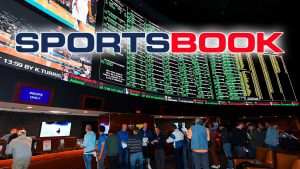Many businesses see the advent of sports gambling as a potential moneymaker. However, sports gambling has raised some challenges as well. Sports franchises, sports teams, and gambling companies are all interested in sports gambling, but they also compete against each other. This is especially true regarding live gambling data. Sportradar, a European company that specializes in sports data and data integrity, has insights into the dividing lines between companies. All the sports gambling companies are trying to get a foothold in the sportsbook market. The current battleground is over the use of live sports data.

The Battleground
 Until May 2018, the sportsbooks business was a moot point. The only place sportsbooks were legal was Nevada. Sports gambling franchises were either underground or offshore. After the U.S. Supreme Court struck down the law banning sports gambling, states raced to legalize it. Businesses raced to prepare for gambling on-site, online, and on mobile apps.
Until May 2018, the sportsbooks business was a moot point. The only place sportsbooks were legal was Nevada. Sports gambling franchises were either underground or offshore. After the U.S. Supreme Court struck down the law banning sports gambling, states raced to legalize it. Businesses raced to prepare for gambling on-site, online, and on mobile apps.
States grant licenses to casino gambling and online gambling franchises. Some sell directly to gambling businesses. For example, some companies create online games for gambling houses. They create all kinds of slot games. Companies also create gambling management software. All these companies are different because they get their games copyrighted, and gambling houses buy specific games.
The Difference in Sports Gambling
 Sports gambling companies are similar to other gaming companies. Some companies directly offer sportsbooks to gamblers. Other companies develop sports gambling platforms and apps to sell. However, all companies involved with sports betting have to get data to run their apps and sportsbooks. The information comes from sports teams and sports leagues. This area of sports gambling is in contention, as companies battle for the best information in the shortest time frame.
Sports gambling companies are similar to other gaming companies. Some companies directly offer sportsbooks to gamblers. Other companies develop sports gambling platforms and apps to sell. However, all companies involved with sports betting have to get data to run their apps and sportsbooks. The information comes from sports teams and sports leagues. This area of sports gambling is in contention, as companies battle for the best information in the shortest time frame.
Sports Data
Nearly as soon as gambling on sports became legal, gambling companies were jockeying for position to get dibs on data. Sportradar is an example of a company that markets sports data. The company has entered into deals with sports franchises to both market and develop integrity monitors. These monitors ensure there is no cheating. After Sportradar signed agreements with sports companies, it sold the data to sportsbooks. Sportsbooks use the data to place odds on games. Examples of information that Sportradar buys would be injury reports, position charts, and player data.
Some companies try to skirt around agreements. Sportradar pointed out some companies that sell data to sportsbooks are using unofficial data they received through open sources. This practice is not illegal. Sports data is not a data stream that companies can own. It’s not a creative monopoly, but, instead, readily available information. Companies cannot own sports data the way they can own a novel or a movie, according to court rulings.
The data battle has become a problem. Companies are warring over whether there should be a single source for sports data. Can companies gather data freely from multiple sources? Do they have to get all their information from one source? The courts have said no. They have found companies offering sports data to gambling houses gathered it from open sources, instead of paying for it. This has caused some concern for sports information companies, such as Sportradar. The company has made its money from supplying knowledgeable sports data to gambling companies for a fee. Sportradar also has to pay fees to get information from sports leagues or individual teams.
Companies that supply sports information seem to think that, over time, the market will sort itself out. The sports information companies that can supply the most reliable information the fastest will prevail. In Sportradar’s case, the company believes its reputation for quick, reliable information sets it apart from the competition.
Disclaimer: All images are copyright to their respective owners and are used by USA Online Casino for informational purposes only.












